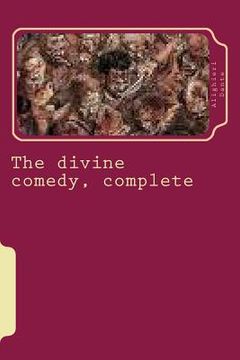Synopsis "The divine comedy, complete"
Divine Comedy Summary Dante Alighieri (1265-1321) wrote his epic poem, the Divine Comedy, during the last thirteen years of his life (circa 1308-21), while in exile from his native Florence. There are three parts to this massive work: Inferno, Purgatory and Paradise. In each section Dante the poet recounts the travels of the Pilgrim-his alter ego-through hell, purgatory, and heaven, where he meets God face to face. The primary theme is clear. In a letter to his patron, Can Grande della Scala, Dante wrote that his poem was, on the literal level, about "The state of souls after death." It is, of course, that and much more. The poem works on a number of symbolic levels, much like the Bible, one of its primary sources. Like that sacred text, Dante meant his work and his Pilgrim traveler to serve as models for the reader. He hoped to lead that reader to a greater understanding of his place in the universe and to prepare him for the next life, for the life that begins after death. The greatness of the Divine Comedy lies in its construction as a summa, or a summation of knowledge and experience. Dante was able to weave together pagan myth, literature, philosophy; Christian theology and doctrine, physics, astrology, cartography, mathematics, literary theory, history, and politics into a complex poem that a wide audience, not just the highly educated, could read. For Dante boldly chose to write his poem of salvation in his own Italian dialect, not in Latin, which was the language of Church, State, and epic poetry during his time. Its impact was so great that Dante's Tuscan dialect became what we recognize as modern Italian. As one of the greatest works, not just of the late Middle Ages, but of world literature in its entirety, the influence of the Divine Comedy has been incalculable. The poem was immediately successful- Dante's own sons, Pietro and Jacopo, wrote the first commentaries on it-and it continues to be read and taught today. Many of western literature's major figures were indebted to Dante's masterwork. A highly selective list includes: Giovanni Boccaccio (1313-75); Geoffrey Chaucer (circa 1344-1400); Don Inigo Lopez de Mendoza, the first Marques de Santillana (1389-1458); John Milton (1608-74); William Blake (1757-1827); Victor Hugo (1802-85); Joseph Conrad (Teodor Josef Konrad Korzeniowski) (1857-1924); James Joyce (1882-1941); Ezra Pound (1885-1972); Jorge Luis Borges (1899-1986); and Italo Calvino (1923-85).

